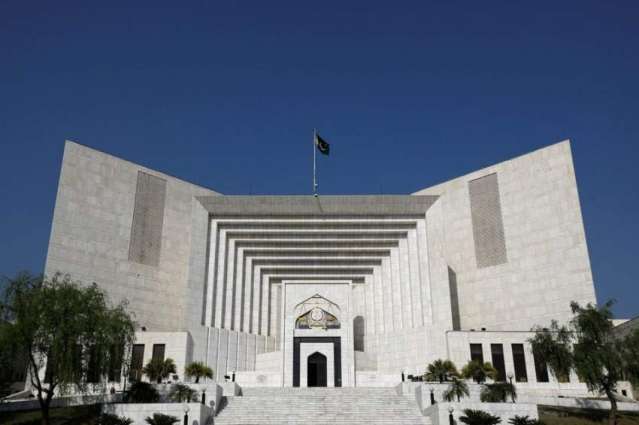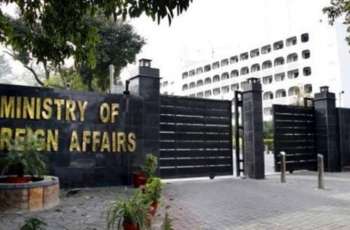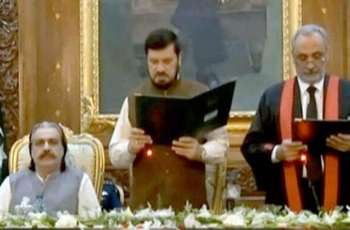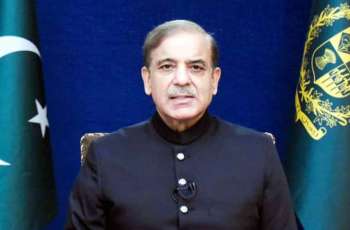Attorney General of Pakistan, Mansoor Usman Awan, informed Chief Justice Umar Ata Bandial during a hearing on pleas against the SC Law that certain provisions of the law overlap, prompting the government to review the bill.
ISLAMABAD: (UrduPoint/Pakistan Point News-June 1st, 2023) In an unexpected turn of events, the Federal government has decided to reassess the Supreme Court (Practice and Procedure) Bill, 2023, which seeks to limit the powers of the Chief Justice to initiate suo motu proceedings and form benches independently.
Attorney General of Pakistan, Mansoor Usman Awan, informed Chief Justice Umar Ata Bandial during a hearing on pleas against the SC Law that certain provisions of the law overlap, prompting the government to review the bill.
An eight-judge Supreme Court bench, headed by Chief Justice Bandial and comprising Justice Ijazul Ahsan, Justice Muneeb Akhtar, Justice Mazahar Ali Akbar Naqvi, Justice Muhammad Ali Mazhar, Justice Ayesha Malik, Justice Hasan Azhar Rizvi, and Justice Shahid Waheed, heard the pleas.
During the previous hearing on May 8, the Supreme Court directed the attorney general to submit the parliamentary debate record regarding the law's provisions that aim to curtail the powers of the Chief Justice of Pakistan. The hearing was adjourned for three weeks, while the court maintained the stay on the law's implementation until a final decision is reached on the petitions.
At the beginning of the hearing, Attorney General Mansoor Usman Awan requested the formation of a full court to hear the case and mentioned that the Pakistan Muslim League-Nawaz (PML-N) had filed a similar petition. Justice Ahsan observed that the government's request had not yet been scheduled for a hearing and inquired whether the attorney general had provided the documents requested by the court during the previous hearing.
Chief Justice Bandial asked the Attorney General if he had submitted the parliamentary record of the Supreme Court (Practice and Procedure Bill) 2023. The Attorney General replied negatively, stating that the record of the parliamentary proceedings is expected to be available by tomorrow as the Speaker's office has been contacted formally and informally.
In another development, the Pakistan Tehreek-e-Insaf (PTI) has submitted a reply to the Supreme Court in the case challenging the practice and procedure law. The PTI has requested the law, known as the Supreme Court (Practice and Procedure) Law 2023, to be declared null and void. The petition argued that specific clauses of the law, including clauses 2, 3, 4, 5, 7, and 8, should be deemed unconstitutional.
The Supreme Court (Practice and Procedure) Bill 2023, which aimed to limit the Chief Justice's power to take suo motu notice, has faced hurdles in its journey to becoming law. While initially passed by both houses of parliament, the bill was returned by the president for exceeding the parliament's jurisdiction.
It was later adopted by a joint session of parliament, albeit with amendments. However, a recent ruling by an eight-member apex court bench has put the implementation of the law on hold, stating that it shall not take effect in any manner. The ruling came during a hearing of three petitions challenging the bill. The fate of the bill and its eventual enactment into law remain uncertain.
The three petitions, filed under Article 184(3) of the Constitution by Advocate Muhammad Shafay Munir, Raja Amer Khan, Chaudhry Ghulam Hussain, and others, argue that the law is tainted with mala fide intentions and request the court to declare it without lawful authority and of no legal effect.
The federal government, law secretaries, as well as the principal secretaries to the premier and president, have been named as respondents in the case. The petitioners urge the court to suspend the bill during the pendency of the petition, and they seek a directive for President Alvi to refrain from giving assent to the bill, preventing it from becoming an act of parliament.
According to the petitions, the federal government does not possess the authority to enact laws that interfere with or regulate the functioning of the apex court or the powers exercised by the judiciary, including the Chief Justice of Pakistan, as mandated by the Constitution. The petitions argue that the contested bill is ultra vires and unconstitutional, as it violates the fundamental principles of justice and the constitutional mandate.
The petitions emphasized that the independence of the judiciary, including the Chief Justice, is enshrined as a fundamental goal in the preamble of the Constitution and is an integral part of its fabric. They contend that the Supreme Court, led by the Chief Justice and its judges, must remain independent from any executive or legislative encroachments to fulfill their constitutional duty of providing justice to the people of Pakistan.
The petitions argued that it is inconceivable for the office of the Chief Justice, with regards to its constitutional powers, to be subject to regulation by the parliament. Safeguarding the independence of the judiciary and the judges, including the Chief Justice, is crucial and protected by the Constitution.
The petition sought to safeguard the independence and functioning of the judiciary in Pakistan, asserting that any attempt to regulate or interfere with its powers and functions constitutes a violation of the Constitution and the fundamental principles of justice.




